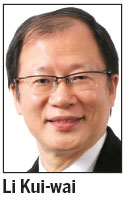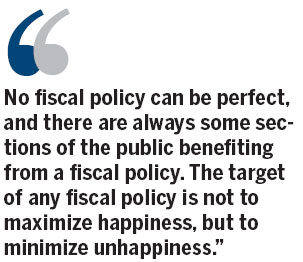Room for fiscal improvement?
Updated: 2013-08-14 06:03
By Li Kui-wai(HK Edition)
|
|||||||
The key features of Hong Kong's fiscal framework and policy include a low and consistent tax structure. This certainly has the advantage that businesses, both old and new, will find Hong Kong an attractive place for business and investment because they can easily estimate their profit level given the steady tax rates. Some have argued that the advantage of the low tax rates in Hong Kong has been eroded by the high land price and high production cost. Nonetheless, the cost is always relative to the size of a business. If the market is on a rise and sales expanding, the cost will be a secondary importance.

Another feature is that the total public expenditure has remained low, and historically it has ranged between 16 and 22 percent of GDP. Normally, it remains below 20 percent of GDP. This is important as it signals low government intervention, and the bulk of activities remain in the private sector, though there is an increasing need for government involvement, especially in infrastructure and social welfare. Welfare expenditures have increased a lot, despite a low growth in population. The balance is that while there is a need for government assistance in alleviating the needy individuals and households in the society, government should stay hands off.
A third feature is the frequency of the fiscal surplus and the large fiscal reserve. In Hong Kong, we experience more fiscal surplus years than deficit years. The only years with severe deficits were the recession years after the Asian financial crisis in 1998. Normally, fiscal surplus is the norm. Due to the lack of military expenditure and the large business sector, particularly in the financial field, active trading generates revenue for the government. There has been discussion as to the size of the surplus and reserve. Hong Kong used to rank as the third-largest reserve economy in the world in the 1980s. Today, Hong Kong ranks lower, but still in the top-10 for sure. The large fiscal reserve is needed to back up the Hong Kong currency and alleviate the economy in severe situations.
Though it has been socially and politically popular, one mistaken view is that the government should spend more when there is a huge surplus. Simple fiscal economics says that government expenditure should behave in the direction that runs opposite to the business cycles, spending more in difficult times, but contracting in good times in order to even out the economy and to avoid either severe difficulty or rapid inflationary situations. The role of the government in exercising fiscal policy is to ensure macroeconomic stability, spend when needed, but avoid overheating in economic good times. One mistake shown in the mid-1990s was that the buoyant economy then was accompanied by large government expenditure in the form of spending more for each item and more items were established.
There is no theory that stipulates an optimal level of fiscal surplus and reserve, regarded as the wealth of the citizens, though they are managed by the government. My own argument is that the fiscal reserve should cover at least 24 months of government expenditure, but more is always better as it gives a higher degree of economic security.

The reality is not just about the size of the fiscal reserve or surplus, but on whether fiscal policy can help to promote the economy, given the basic role of macroeconomic stability. Since the Asian financial crisis, it has been unfortunate that the government has engaged more "demand-driven" policies that provided mainly short-term advantages to alleviate economic ills. Such short-term alleviation did avoid extreme economic hardship, but could not be growth-driven nor help to promote the competitiveness and capability of the economy. When stability is restored, the fiscal policy should be redirected more to promote "supply-driven" strategies that would help to attract investment, promote jobs and increase employment, rather than a "Santa Claus" policy that simply dished out cash to individuals. It would be simple and naive to have a "crisis" mentality to run a "non-crisis" economy.
To have a surplus and a large reserve is not a mistake, given the open nature of the Hong Kong economy. But it would be a "missed opportunity" if the government in economically good times does not engage in long-term strategies that could promote and enlarge Hong Kong's economic long-term capability so that there would be more expansion for our future generations. There is a need to come up with more long-term, all-round economic strategies so that the existing economic resources could be expanded and/or efficiently used.
Hong Kong's fiscal policy should not be politicized. No fiscal policy can be perfect, and there are always some sections of the public benefiting from a fiscal policy. The target of any fiscal policy is not to maximize happiness, but to minimize unhappiness. With economic recovery in Hong Kong in the last few years, there is indeed a need to use fiscal policy to direct growth. The low tax regime and the low percentage of total public expenditure should not be changed, as this has become Hong Kong's "economic landmark". Always, the government can act as a stimulator and provide "fertilizer-like" incentives to businesses.
In short, the government can take a more active role in promoting the economy, and additional fine-tuning and restructure can be exercised in the fiscal framework. But the basic principles in our fiscal policy are the "golden egg" which has served the economy well. We should not politicize the fiscal policy.
The author is associate professor of the Department of Economics and Finance at City University of Hong Kong.
(HK Edition 08/14/2013 page9)